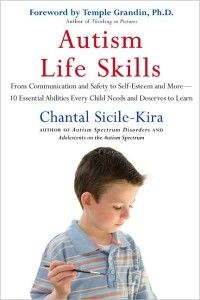
Autism
Autism Life Skills: What Do We Need to Teach?
Adults with autism have advice to offer on what children need to learn.
Posted July 19, 2018

When our daughter Rebecca was young, she became more and more independent as the years flew by. Now a young adult, she is living in Seattle, has a job, is in love and is surrounded by good friends. This is the same kind of life our autistic son, Jeremy, dreams of. We have done our best to prepare both our children to live fulfilling and productive lives to the best of their abilities.
Those who have seen Jeremy’s high school graduation commencement speech video, will remember how grateful he was for all he learned at school. They will also remember his wish that he had made more friends. Sadly, creating and sustaining friendships are probably one of the hardest aspects of autism for Jeremy.
As we considered how to best prepare Jeremy for the adult life he envisioned while he was still in high school, I wondered what we could have done differently when he was younger. That made me think:
What would adults on the autism spectrum point to as the most important factors in their lives while they were growing up? What had made the most impact on their lives as adults in terms of how they were treated and what they were taught as children? What advice did they have to offer on how we could help our children prepare for real life?
I decided to find out. I interviewed a wide-range of people—some considered by neurotypical standards as “less able,” “more able” and in-between; some who had been diagnosed as children; and some diagnosed as adults.
The result of these conversations and e-mails became the basis of my book, Autism Life Skills: From Communication and Safety to Self-Esteem and More—10 Essential Abilities Your Child Needs and Deserves to Learn (Penguin). And although this book was published ten years ago, its contents still hold true today and offer practical advice from those who know best: people on the spectrum. Often I hear from parents on how this book is one of their favorites of all those that I have written. As well, I’ve had parents tell me this book helped them in raising their neurotypical teenagers!
Although some areas discussed with adults on the spectrum seemed obvious on the surface, many conversations gave me the “why” as to the challenges they faced. This then led to discussions about what was, and what was not, helpful to them. No matter the differences in their perceived ability levels, there were 10 skill areas important to all. In this blogpost, I’ll be covering the skill those interviewed considered the most important: making sense of the world.
Making sense of the world is what most adults conveyed to me as the most frustrating area they struggled with as children, and was directly related to their sensory processing challenges, and that impacted every aspect of their lives: relationships, communication, self-awareness, safety and so on. Babies and toddlers learn about the world around them through their senses. If these are not working properly and are not in sync, they acquire a distorted view of the world around them and also of themselves.
Most parents and educators are familiar with how auditory and visual processing challenges can impede learning in the classroom. Yet, for many, sensory processing difficulties are a lot more complicated and far reaching. For example, Brian King, a licensed clinical social worker who has Asperger’s, explains that body and spatial awareness are difficult for him because the part of his brain that determines where his body is in space (propioception) does not communicate with his vision. This means that when he walks he has to look at the ground because otherwise he would lose his sense of balance.
Donna Williams, Ph.D., bestselling author and self-described “Artie Autie,” had extreme sensory processing challenges as a child and still had some when she passed away in her fifties, but to a lesser degree. Donna talked about feeling a sensation in her stomach area, but not knowing if it meant her stomach hurt because she was hungry or if her bladder was full. Other adults mentioned to me that that they shared this same problem, especially when experiencing sensory overload in crowded, noisy areas. Setting their cell phones to ring every two hours to prompt them to use the restroom helps them to avoid embarrassing situations.
Many adults found it difficult to tolerate social situations. Some adults discussed how meeting a new person could be overwhelming—a different voice, a different smell and a different visual stimulus—meaning that difficulties with social relationships were not due simply to communication, but encompassed the total sensory processing experience. This could explain why a student can learn effectively or communicate with a familiar teacher or paraprofessional, but not a new one.
The most helpful strategy was knowing in advance where they were going, who they were going to see and what was going to happen, so that they could anticipate and prepare themselves for the sensory aspects of their day. Other strategies included changing their diet, wearing special lenses, having a sensory diet (activities done on a regular basis to keep from experiencing sensory overload), undergoing auditory and vision therapy, as well as using desensitization techniques.
In next week’s post, I’ll discuss the skill areas of communication and safety.
References
Sicile-Kira, C (2008). Autism Life Skills: From Communication and Safety to Self-Esteem and More - 10 Essential Abilities Every Child Needs and Deserves to Learn. New York, NY:The Penguin Group



